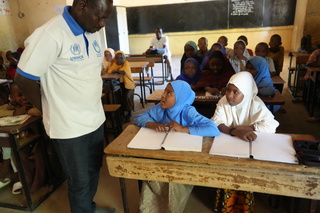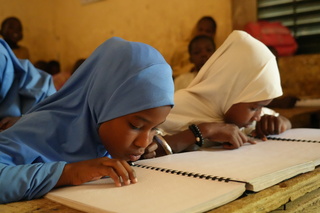share

Malika, 10 years old, dreams of becoming a teacher when she grows up. Niger. | © J. Labeur / HI
Malika is ten years old and lives in Maradi, Niger. She has a visual disability and, with the support of HI, she is now in third grade at school and is making great progress.
Malika bends over her Braille textbook, applying herself assiduously to her lessons. She loves going to school, especially as education has not always been an option for her. Visually impaired since she was little, Malika has had to overcome mockery and barriers to be able to attend school. Today she is determined to make progress and push back the boundaries.
 "She was only four months old when I first realised that she wasn't following the objects I showed her with her eyes. At night, when I shone a torch at her, she didn't react," recalls Halima Salissou, her mother. One day, when she had to run an errand, Halima went out and left Malika alone at home. When she returned, she immediately saw that something was wrong: her daughter's eyes were red and watery.
"She was only four months old when I first realised that she wasn't following the objects I showed her with her eyes. At night, when I shone a torch at her, she didn't react," recalls Halima Salissou, her mother. One day, when she had to run an errand, Halima went out and left Malika alone at home. When she returned, she immediately saw that something was wrong: her daughter's eyes were red and watery.
"I will never forget that day," Halima says in a whisper. "It was as if everything fell apart at once, it was so traumatising. A few days later, when my little Malika was feeling better, I saw that she was having trouble reaching for her favourite toys. When I asked her why, she told me that she couldn't see properly.”
Panicked, Malika's parents took their daughter for a series of ophthalmological consultations. The doctors always concluded that there was nothing wrong because Malika could usually recognise her surroundings and the shapes and colours of everyday objects. However, her visual disability was a reality and prevented her from being fully autonomous.
Malika's parents felt lost and helpless. They had to rethink their day-to-day lives and devoted a lot of energy to accompanying and supporting their daughter. The weight of being judged by society and the neighbourhood gossip cut Malika off from the outside world. For fear of being laughed at, she hardly ever left the house. She had no friends to play with and didn't go to school. Her parents were worried about what would become of her.
It was then that Malika's family met HI, during a disability awareness event organised in their neighbourhood. An employee of the organisation went to see her parents to convince them to enrol her in school. They were very reluctant: the financial burden was heavy and they didn’t think she would manage at school. Fortunately, her father was finally convinced of the opportunity this represented for her. He undertook to give her all the support she needed.
 Malika was first enrolled in an inclusive class where she could catch up with her studies with the help of specialised support. She soon found her feet, thanks to the support of her parents and her teacher, Azara Yahaya. Going to school has allowed her to make friends. Her best friend is Habsatou, her tablemate, who is also visually impaired. They have become inseparable.
Malika was first enrolled in an inclusive class where she could catch up with her studies with the help of specialised support. She soon found her feet, thanks to the support of her parents and her teacher, Azara Yahaya. Going to school has allowed her to make friends. Her best friend is Habsatou, her tablemate, who is also visually impaired. They have become inseparable.
"At first it was not easy because I didn't understand Braille. But with HI’s help, I learned to read Braille and now I can follow the lessons and do my homework. My favourite subject is oral communication," Malika says proudly.
"Malika is a very calm child who is receptive in class and gets very good marks in her tests," says Azara Yahaya. To ensure that she is studying in the best possible conditions, HI has provided her with educational materials adapted to her disability: tablets, cubarites (dice-shaped tools used for calculation), a Braille punch, Braille paper, dominoes and toys. She has also taken an introductory course in Braille and receives extra support from her teacher for classwork. Lastly, HI has signed her up for a course that introduces children with visual impairments to computers.
Since her inclusion in school, Malika has discovered a zest for life and a taste for human contact. To facilitate her integration, HI organised disability awareness sessions in her school. Through games and workshops, the organisation's teams informed all the pupils about the rights of people with disabilities.
Malika's enjoyment of school is a relief to her family. Her parents are very happy to see her flourishing like any other child of her age. They are also relieved to see that she is making good progress at school and becoming more and more autonomous. They are now confident that with her education she will be able to get a decent job and won't ever be in need.
"Thanks to HI, my dream of becoming a teacher can come true. I will be able to help all children with visual disabilities so that they too can enjoy their right to a quality education," says Malika, earnestly.
HI's inclusive education project in Maradi is funded by Luxembourg Ministry of Foreign Affairs, NORAD and Unicef. Since it was launched in 2017, it has provided more than 80 schools with adapted pedagogical and didactic material, identified nearly 5,000 children with disabilities for personalised support and trained nearly 600 teachers in inclusive education, sign language and Braille. In addition, 380 parents have been informed about deafness and introduced to sign language and nearly 50,000 parents and community members have been informed about and trained in disability and inclusive education. 260 actors from the public services and the world of work have been informed about how to welcome people with disabilities. Finally, 35 educational advisors have been trained and 80 young people with disabilities have received adapted professional training.








HI is an independent and impartial aid organisation working in situations of poverty and exclusion, conflict and disaster. We work alongside people with disabilities and vulnerable populations, taking action and bearing witness in order to respond to their essential needs, improve their living conditions and promote respect for their dignity and fundamental rights.
HI is an independent and impartial aid organisation working in situations of poverty and exclusion, conflict and disaster. We work alongside people with disabilities and vulnerable populations, taking action and bearing witness in order to respond to their essential needs, improve their living conditions and promote respect for their dignity and fundamental rights.